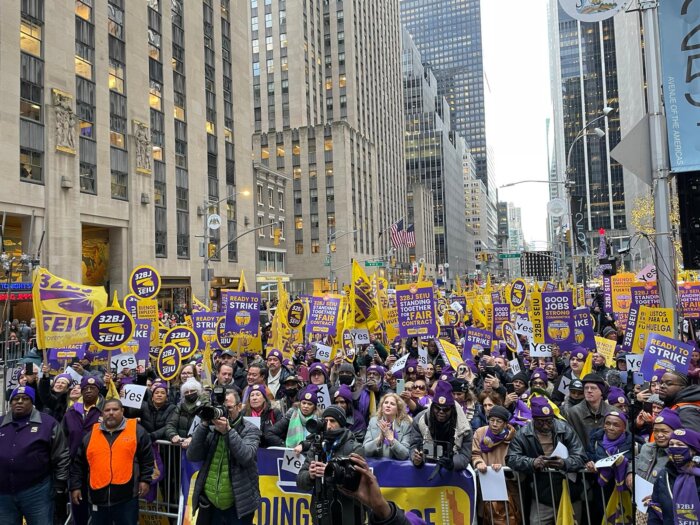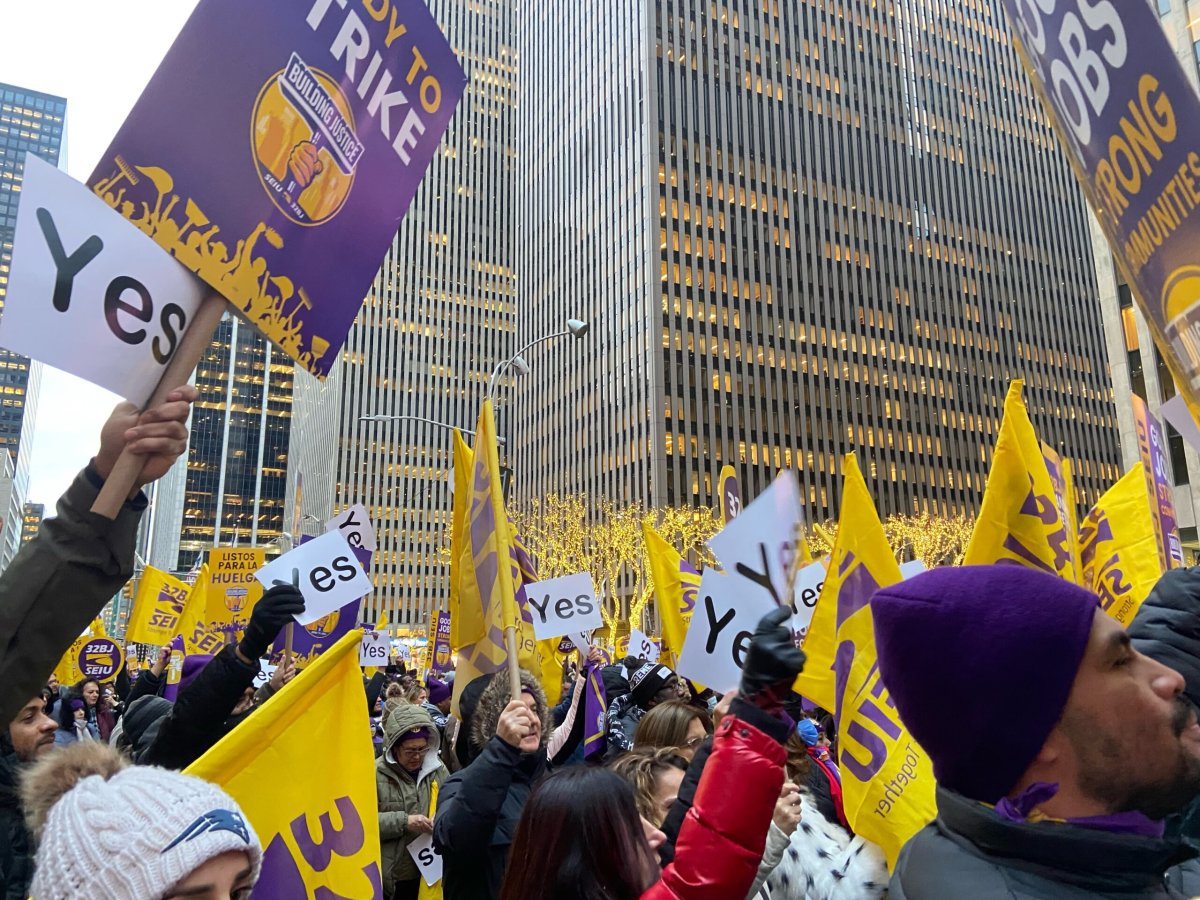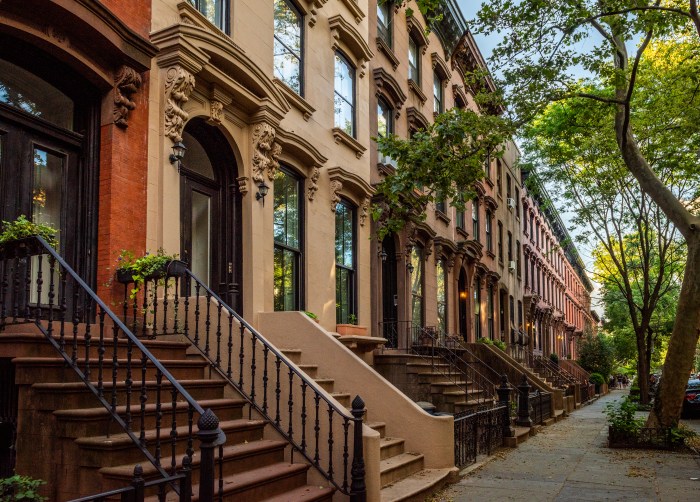An estimated 10,000 members of property services union SEIU local 32BJ marched and rallied outside of Radio City Music Hall and 30 Rockefeller Center on Wednesday after voting to authorize a potential strike and urged the Realty Advisory Board to agree to a new contract.
32BJ represents about 20,000 commercial cleaners in New York City who were responsible for cleaning and sanitizing many of the city’s iconic buildings during the COVID-19 pandemic, ensuring residents and businesses were safe while the illness continued to spread.
The union negotiates new contracts with the Realty Advisory Board on Labor Relations Inc. — the organization that represents many of the city’s major commercial building owners, managers and cleaning contractors — every four years. Their current contract, last negotiated just before the pandemic, is set to expire on Dec. 31.
But 32BJ and RAB have been locked in a bargaining stalemate since negotiations began on Nov. 9. According to 32BJ, RAB’s proposed contract would make union members pay for their health insurance premiums — which were covered in previous contracts — establish a permanent second-tier workforce that would prevent new hires from accessing benefits and better wages, eliminate overtime wages after eight hours and cut labor protections despite previous layoffs.
“Our members need to move forward, not backwards – they need wage increases that allow them to pay for rising rents, the rising cost of transportation, the rising cost of everything,” said 32BJ president Manny Pastreich on Wednesday. “We are demanding that we have health insurance we can count on and can afford. We are demanding pension improvements. We are going to make sure these contractors can’t attack our jobs. We have had four bargaining sessions and made zero progress. Time is running short for the RAB to make a deal.”

Union members authorized a potential strike during the rally which, if necessary, would impact 1,300 buildings throughout the city. 32BJ last went on strike in 1991.
The real estate industry has reduced labor costs in New York City in order to recoup after the pandemic, eliminating 2,000 commercial cleaning positions while 32BJ also saw layoffs of about 7,000 members. Despite this substantial decrease in workforce, union reps say that commercial rent prices have increased with, job growth today actually surpassing levels in 2019, which the union says suggests the real estate market should be able to accommodate 32BJ members and their contractual demands.
However, reps for RAB say their contract proposals reflect the untenable nature of the real estate industry as it, too, recovers from the pandemic.
“Over the past three years the New York commercial real estate industry has and continues to encounter soaring vacancies, untenable interest rates, declining building valuations, and the resultant economic uncertainty,” RAB president Howard Rothschild said in a statement released Nov. 28. “The future of both the industry and our workforce is at risk without implementing alterations to enhance flexibility in our [collective bargaining agreement] and our healthcare coverage. At this crucial point, it is essential for the union and the industry to come together to create an agreement that secures a future that is both viable and sustainable.”
‘Disappointing’ treatment
32BJ members were designated as essential workers during the pandemic as they were integral to sanitization and minimizing the spread of the virus, but now, workers say they feel undervalued and unappreciated by RAB as the proposed contract would force them to pay for their own health insurance — the very same health insurance that kept many of them alive when they contracted COVID-19 and fell gravely ill on the job.
Ena Softley, a building cleaner and member of the contract bargaining committee told Brooklyn Paper in November that her insurance was the only reason she survived after she contracted COVID-19 in early 2020.
“It’s disappointing because all we ask for is that we are being treated, given the same dignity and respect and the sacrifices as we have given to their tenants,” said Softley. “And we really would like them to acknowledge and to recognize all of the sacrifices that we’ve made during COVID, and the fight for us now is to keep our healthcare because many of our co-workers died. Even though we had healthcare. And if we didn’t have healthcare, I would have died.”
Other 32BJ members reiterated how important their health insurance was to their livelihood, saying they were forced to work during the pandemic and the additional health insurance costs under RAB’s current proposal would be an expense they couldn’t afford.
“I’ve spent half my life as a 32BJ commercial member and right now I am angry!” said Goodwin Dillon, a commercial cleaner and 32BJ strike captain. “The RAB proposals put our ability to take care of our families at risk. We are talking about 20,000 working families’ livelihoods at stake. More of us could be forced to move out of the city. More of us would have to choose between our health and paying rent. More of us could be forced to take second jobs.”
Several influential elected officials came out to support 32BJ members at the rally, like New York City Mayor Eric Adams and Senate Majority Leader Chuck Schumer — both of whom said that their relationships with unions and 32BJ were major contributors to their successful elections.
“A while back I was able to get some contracts for the airport workers,” said Schumer at the rally. “Now the great thing we have done in New York we want to spread across the country so that 32BJ and the good example you’ve set will help tens of thousands of working men and women throughout America so they’re not contracted out, so they’re represented by a union, so they can get the good pay, benefits and healthcare they deserve.”
Now with a strike authorized, 32BJ members say they will continue to work to signal to the RAB that they are willing to take drastic action to ensure that the contract will benefit employees.
“Bargaining involves two sides and so we have to work hard to find solutions, they’ll have to work hard to find solutions,” 32BJ president Manny Pastreich told Brooklyn Paper on Dec. 8. “The best way to avoid a strike is to be ready for one, and that’s the only approach we are taking and honestly it’s the approach we’ve always taken. This is a serious situation, there are real changes in the industry and there’s impacts to those. So we have to take everything that employers are saying with the utmost seriousness and be ready.”
























